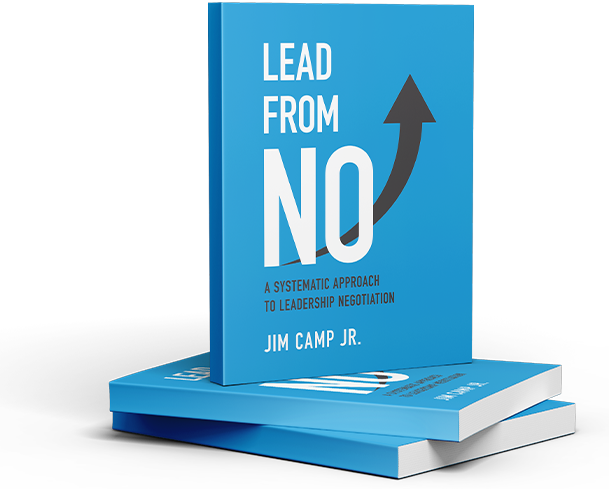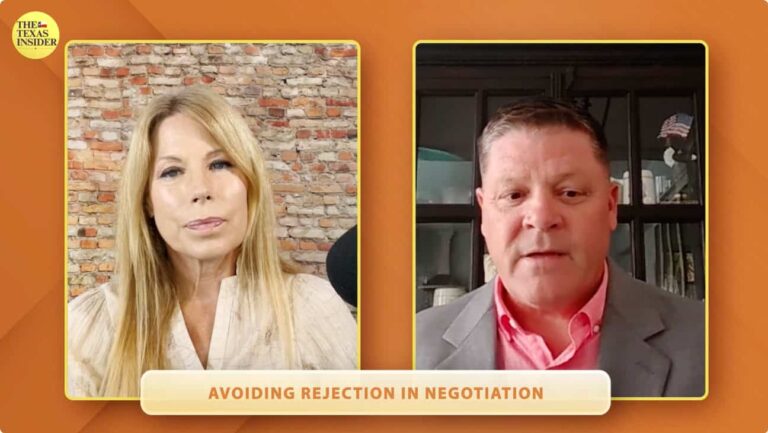When an average negotiator talks about what’s stalling a negotiation, they’ll start complaining.
They’ll say how their adversaries are stubborn, idiotic, difficult, uncooperative, greedy, or manipulative.
Many people think that the problem is “the other person.” They may not admit this, but that’s often what they’re thinking and complaining about. The other person is the perfect scapegoat for a deal that fell through.
How often do you feel that “the other person” is holding up the negotiation or causing it to go awry?
Stay with this question for a while. It is a part of your mindset that is preventing you from seeing the real issues that drive or stall a negotiation.
Stop the Blame Game
We live in a world where complaining is a favorite pastime of a large number of people. People are willing to blame everyone and everything for the current state of their lives. Then they absolve themselves of any blame. Some have the “martyr’s complex.” They think that they are giving and flexible, while other people are mean, ungrateful, and undeserving of their benevolence.
Some people will lose their shirt before they admit that the other person is not the problem. They become conditioned and only see other people as the source of their problems. From experience, we have learned that such people are tough to help.
The Real Issues are Set in your Adversary’s World (almost always…)
The real problems stalling or driving a negotiation exist in your adversary’s world. (Not all, but nearly all, and we’ll explain more about this later.)
Why is the adversary in a negotiation with you? It’s always for their own reasons. They are not in it for your reasons. Every decision the adversary makes during a negotiation is made for themselves, not you. If they are benevolent to you, it’s because they want, choose, and decide to be generous – for their own reasons.
Is Their Vision a Reality?
The decisions that the adversary makes are based on their vision of the realities in their world. Some of these realities will be “real”, while others might “not be real.” You’ll likely encounter a mix of both. They could be assumptions, mistaken perceptions, erroneous judgments, and unfounded expectations. Since they make up the adversary’s vision, they drive his or her decisions. Perhaps you’ve seen these:
• constraints
• deadlines
• present or future problems
• existing or potential opportunities
• hidden agendas and motives
• a need to feel important and respected
• the opinion of someone
• a memory from last week or from 30 years ago
• a pending disaster
You must discover what exactly makes up your opponent’s existing vision. Always ask yourself, what is driving this behavior? What is driving this decision? Who or what am I overlooking?
Your Mission & Purpose (M&P) is the Key
Your M&P gives you the platform to listen and learn about your adversary’s world, and make it easier for them to reveal the vision that drives them. That is why your M&P must be set to their benefit, with no benefit (money, power, prestige) to you. None at all.
An unclear M&P is dangerous. The foundation of all negotiation is effective decision-making, and the foundation of all effective decision-making is the M&P. It is critical to success, and it’s something that we must make a habit. Everything you say or do should be aligned with the M&P.
The Camp System defines mission as a self-imposed, long-term aim, ambition, or calling.
Purpose is a continuing task and responsibility; it is what you do on a regular basis to achieve your mission.
What’s a good M&P?
M&P must be valid, and there are two rules to follow to establish a valid M&P.
Rule #1 – Money and power can never be the mission and purpose of an organization.
Rule #2 – It is imperative to set the mission and purpose in the adversary’s world. Our world must become secondary.
The rules of the M&P work beyond the realm of negotiation. Politicians seeking votes must set the M&P in the minds of the voters. Business owners must set the M&P in the world of the customer. For the negotiator, the M&P must be set in the world of the adversary.
Here is a bad M&P: A salesperson wants to sell 10,000 of Product A and make $5 million.
Here is a good M&P statement: A salesperson wants to provide their customers with a dependable Product A that can sustain the profitability of the customer’s company into the future.
Why is this a good M&P? You’re not chasing the results of your world or things you can’t control. You do have total control over the quality of Product A, your pricing, and your mission and purpose.
If you are looking for even a small benefit for yourself, you will become needy and this behavior will compromise your decision making.
What the M&P Does For You
Some of the benefits of an M&P include:
1) An M&P prevents you from getting trapped or stuck in your world, and from dragging your adversary into it.
2) It helps you discover whether you ought to even be negotiating this agreement at this time or not. In other words, you find out whether you can or even want to solve the adversary’s problems with your product, proposal, or suggestion.
3) It helps you find out what the adversary’s problems are by providing them the opportunity to tell you what’s important to them.
4) It discourages guessing what your adversary wants and the practice of sending proposals back and forth.
5) Not focusing on yourself avoids a conversation about how great your company, product, suggestion, track-record, or proposal is. This is a silly waste of your time and energy budget.
6) Complaining, moaning, or wishing the adversary was on the way to moon won’t get you closer to an agreement. You haven’t discovered whether you ought to be negotiating or hitting the road. Worst of all, you’re looking for a scapegoat to blame.
7) Thinking that the respected opponent is the problem prevents you from seeing and resolving the real problems in the adversary’s world.
It takes effort, focus, patience, and a commitment to your valid M&P to discover the issues beneath the surface. Actually, it takes negotiation mastery to be able to do so.
Most people take the easier path of trying to control the negotiation, instead of bringing real issues to the table. Of course, attempts to control will backfire, be resisted, and will provoke a reaction from the other party. Even worse, this will provoke a reaction from you, and hence, a vicious cycle is born.
Which Issues That Stall Negotiations Are NOT Set in Your Adversary’s World?
You may not like the answer, but at Camp Negotiations, we say that when you are trying to diagnose the problems standing in the way of agreement, start with yourself. Your behaviors, decisions, choices, body language, tone of voice, reliability, credibility, reputation, history might be a problem.
Do you think it’s unfair that we said you shouldn’t think that the adversary is the problem, but then we turn around and examine if what you are part of the problem? We look at your ability to influence decisions and reach a stable, profitable, and ethical agreement. That’s why you must accept the fact that the other person or team cannot be the problem, but that you or your team may be.
It takes effort, practice, and a mindset shift to overcome the habit of thinking that the other person or group is the problem.
This is also why you must never negotiate without a valid M&P that you are committed to, intellectually, and emotionally. To embrace a valid M&P, you must be emotionally calm. We cannot pretend that this will always happen. Sometimes other pressures make it impossible. We may be experiencing intense emotions that make it impossible to be calm enough to construct and embrace a valid M&P.
The Hard Part
In the case where you are not emotionally calm, call off the negotiation. Let’s face it, you simply are not in the state-of-mind to make or influence effective decisions. Your decisions, decision-making, and judgment are compromised. It is not the end of the world.
If you don’t walk away, and you persist in negotiating, you could end up with a negotiated agreement that is much worse than the one you could have reached. Even worse, other dangers include an impasse or a conflict that spins out of control.
Learning when to call off a negotiation is something that only those who are serious about negotiation can do. Also, it can become a road to profound internal growth through increasingly accurate self-knowledge. As you learn to engage calmly, process, and accept your emotions, you will become better equipped to handle tough situations. The more you rely on a valid M&P, the more calm and steady you will become. You’ll consistently see the real issues driving or stalling the negotiation, and not lay blame on the other person or team.





